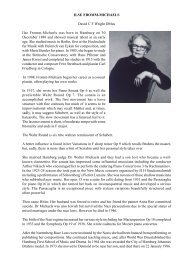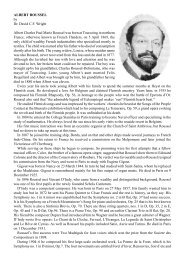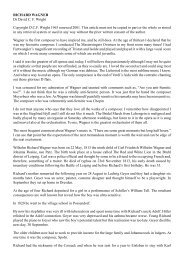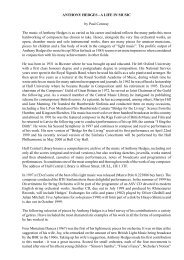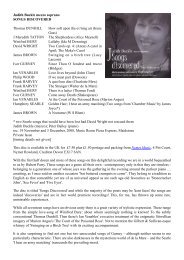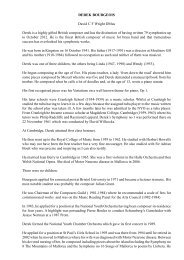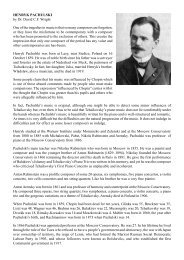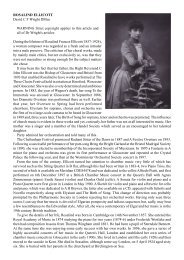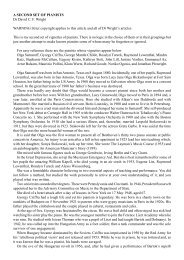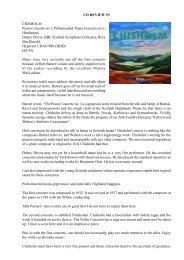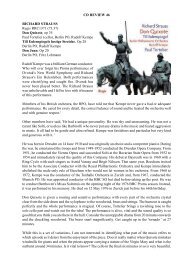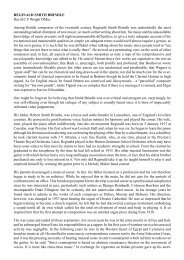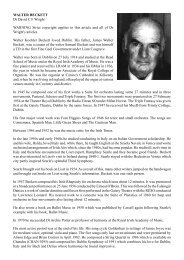David Barlow - Dr David Wright
David Barlow - Dr David Wright
David Barlow - Dr David Wright
Create successful ePaper yourself
Turn your PDF publications into a flip-book with our unique Google optimized e-Paper software.
a work of powerful musical imagery, was first performed in St. Thomas’s Church for the Newcastle Festival<br />
on 15 October 1969 when <strong>Barlow</strong> was its "composer of the year". The Ulster Orchestra, with soloists including<br />
Hazel Holt, Michael Rippon and Philip Langridge was conducted by Janos Furst. Other "Biblical" works are<br />
Judas, an oratorio in four scenes with a prelude; Susanna and the Elders; Portrait of Deborah, a Sinfonia<br />
Concertante for violin and small orchestra; Three Settings from the Song of Solomon; Genesis for piano and<br />
other religious works for chorus. His other literary interests included Wordsworth, the Brontes, Tennyson,<br />
John Clare and the mysticism of Gerard Manley Hopkins which was closely reflected in his own psyche. His<br />
ex-wife described him as a man of the people, and of a left-wing persuasion, although he was never active in<br />
politics. Music remained his one and only consuming passion. Each of his compositions is remarkable for a<br />
consistency of style throughout, a quality missing in the works of some composers.<br />
In the 1960s <strong>Barlow</strong> produced some interesting scores. The Five Preludes after the Tempest date from 1965<br />
and were written for the Northern Sinfonia at the invitation of the Hexham Abbey Festival. Their moods<br />
were suggested by lines or situations from Shakespeare’s plays. The first prelude, "Malediction", suggests<br />
Caliban’s hatred of Prospero; the second, "Sea Change", is full of typical <strong>Barlow</strong> melancholy sighs; the<br />
third, "Invocation", has violent interruptions; the fourth, "Ariel", is a tenuous scherzo and the fifth, untitled,<br />
quotes as a motto Prospero’s lines "We are such stuff as dreams are made of, and our little life is rounded<br />
with a sleep". This is a work of supreme imagination. Homage to John Clare, and the scena November 1951<br />
for soprano and orchestra, are both closely affected by the scenery of the East Midlands. Homage to John<br />
Clare was inspired by words penned by the poet in a Northampton lunatic asylum - "All dark and absent like<br />
a corpse’s eye" (referring to an autumn night); and by contrast, "Where the pheasant’s red eye for a moment<br />
was caught, then vanished away like a humming bee’s song". The first quote is portrayed musically as<br />
sombre and atmospheric; the second quote has two textures, one slow and mournful, the other light and<br />
rhythmic. The orchestral writing is superb; the score is highly evocative and the effect spiritually satisfying.<br />
The work has a tremendous warmth with woodwind figurations suggesting shafts of autumnal sunshine; the<br />
wonderfully translucent textures are superlative. November 1951 blends the soprano with judicious orchestral<br />
writing. This is deeply-felt music of the soul, rich with opulent sounds; this fecund work should be taken up<br />
by discerning singers. These two impressive works are sometimes tonal, occasionally modal, but also reflect<br />
the result of his musical reassessment which occurred about 1962 when <strong>Barlow</strong> closely studied the works of<br />
Webern. <strong>David</strong> <strong>Barlow</strong> had made friends with the blind composer, Paul Crunden-White, who had come to<br />
live and teach in Rothwell. He was a student of Priaulx Rainier. Rainier had studied with Nadia Boulanger,<br />
and <strong>Barlow</strong> caught some enthusiasm for Rainier’s work and her interest in the dodecaphonic style, particularly<br />
her work Quanta for oboe and string trio (1962) which clearly influenced his own work, some of which<br />
employed the oboe. <strong>Barlow</strong>’s compositions were now in a more intense, compact style which used modified<br />
serial-methods as in the Oboe Quartet of 1963, the Theme and Variations for string trio of 1965, and the<br />
superb Five Preludes after the Tempest. Bearing in mind his catholic taste and previous dedication to the<br />
English Pastoral School this reversal of thought is remarkable. In earlier years he listened to music by<br />
Humphrey Searle in the dark, shining a torch into his face which he deliberately contorted to amuse his<br />
friends. In his maturity he admired the "brilliance of the unsurpassed originality" of Searle’s music. He<br />
retained his love for Bach (he used to play recordings conducted by Karl Richter at an unreasonable volume<br />
level); he adored Mozart and Beethoven; loved the opulence of Debussy; the deftness of the songs of Duparc<br />
and, in a different style altogether, valued the Brahms symphonies and had an "uncontrollable enthusiasm<br />
for Wagner". He went through a highly excited phase in studying The Ring. As for English music he liked<br />
Elgar; was particularly keen on Britten, especially Peter Grimes and the War Requiem, yet he admitted that<br />
Tippett was a far greater composer. His fondness for women, as indicated in the subject matter of some of his<br />
works coupled with his habits and his fascination with Rainier and Boulanger, led him to express lavish<br />
praise about their musicality when it was sometimes unmerited. Like John Clare, he was a troubled soul<br />
wanting desperately to be loved and accepted; full of self-doubts and painful inner conflicts.<br />
He was, however, a fine musician. As a lecturer he was superb and did not need copious notes; he dealt with<br />
the history of music, covering the nineteenth and twentieth centuries, harmony, scoring and keyboard skills.<br />
Talented and committed students, such as Robert Sherlaw-Johnson and Anthony Payne, found him excellent;<br />
those less gifted probably saw him in a different light.



